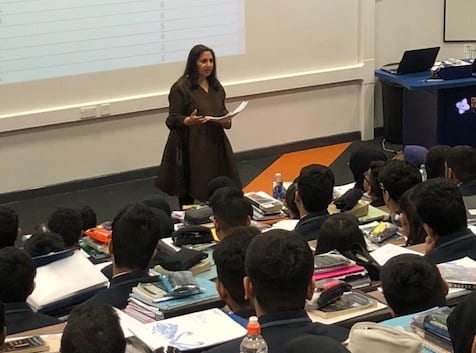 I spent a lovely hour on Friday listening to Imtiaz Dharker, who visited Dixons Kings as part of the Ilkley Literature Festival. I came hoping for the cheat-sheet on Tissue, but I left her talk with a renewed love for poetry and especially for Tissue. Here are some of her words and some of my thoughts.
I spent a lovely hour on Friday listening to Imtiaz Dharker, who visited Dixons Kings as part of the Ilkley Literature Festival. I came hoping for the cheat-sheet on Tissue, but I left her talk with a renewed love for poetry and especially for Tissue. Here are some of her words and some of my thoughts.
“Poetry travels without a passport.”
Dharker read some of her poems, including Tissue, Blessing and This Room, explained the inspiration behind them and shared moments from her life. A running theme from the talk was the way that we tend to close ourselves off, pigeonhole each other, say how things should be. “Listen for the human voice that cuts across borderlines,” says Dharker. Dharker says that she is a “Scottish Muslim Calvinist adopted by India and married into Wales” and that, like her own, “your identity is always travelling.” I had no idea that This Room and Blessing, two poems I have taught in the past, were based on her own experiences in India. It was nice to draw this line through those poems and now Tissue, all poems about breaking free, casting aside restrictions that we may face. We see this in Tissue, the way that “The sun shines through/ their borderlines” and we see the “breaking out” and “lifting out” of This Room and the “flow”, “rush” and “bursts” of Blessing. Poetry describes this freedom but poetry is this freedom. It certainly freed Dharker: “Poetry gave me a different kind of freedom.”
“Listen for the human voice”
Sometimes it’s hard to explain what poetry is or to put into words why it matters. Who better to do this than a poet: “Poetry says things that the heart knows before the mind has a chance to catch up.” The idea of poetry giving a voice is important as when Dharker was a child she used to have ideas, but “my tongue couldn’t catch up.” A moment that changed her relationship with poetry and the world was when her teacher Miss Murray noticed her poem, loved it, typed it up and published it in the school magazine: “It changed my whole world. It changed everything.”
“One of the jobs of poetry is to pay attention to the detail”
Dharker explained the inspiration for Tissue – a note from her father in the back of the Quran. This was seen at the time when she and her father were out of touch and she hadn’t spoken to him for a long time. This “flimsy piece of paper” brought home to her that it is family and relationships that matter, not the structures we build, not bricks and mortar and stone. Tissue is “written like a love poem” to remember her father. The connections between the most precious and the flimsiest things is explored. Paper is precious and flimsy. Human connections are precious and flimsy. Tissue as a love poem is a wonderful lens to view it through.
Dharker patiently and enthusiastically answered our students’ questions about Tissue. After the talk, some students stayed and had their anthologies autographed. At least one starstruck teacher asked for a selfie, but he will remain nameless…